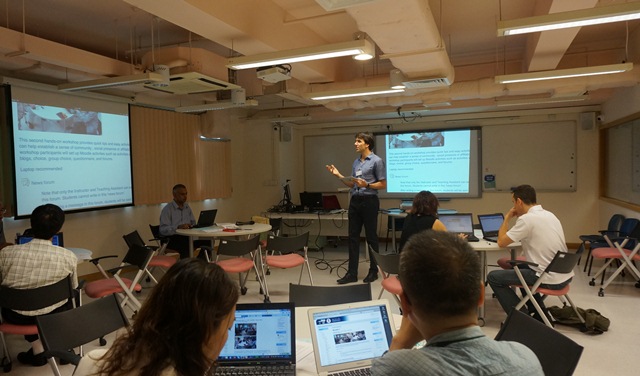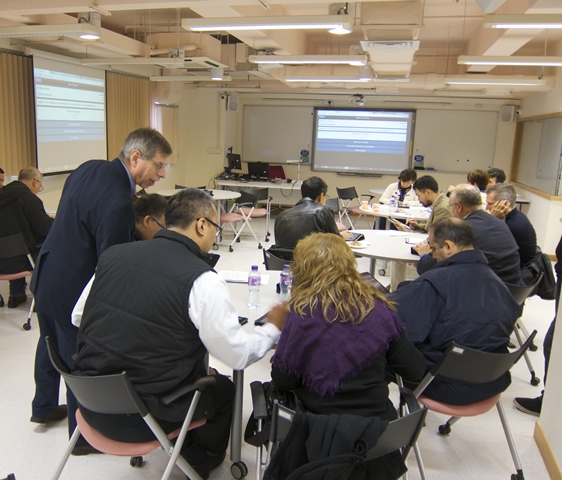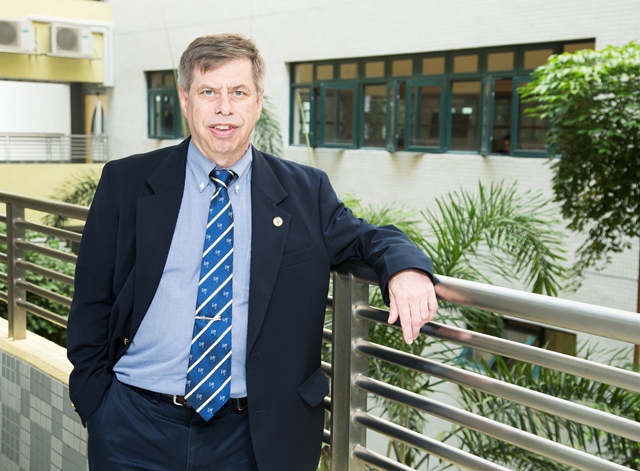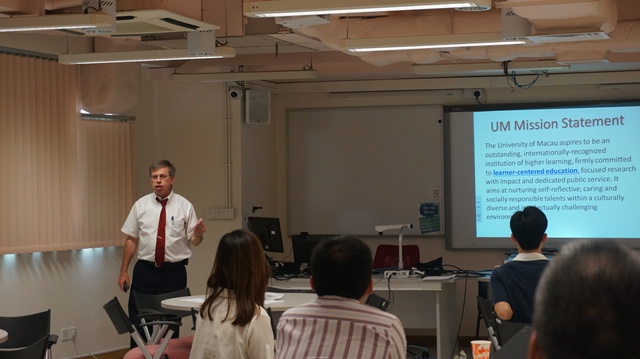Source: umagazine
In this increasingly globalised world, every country is thirsting for talent. Governments and universities around the world are actively seeking to nurture high-calibre graduates to meet society’s needs. In April 2014, the government of the Macao Special Administrative Region (Macao SAR) established a long-term talent development mechanism, in an effort to address the acute talent shortage in Macao. How can the University of Macau (UM), a leading institution of higher education in Macao, reform and enhance its teaching and learning, to meet the constantly changing needs of the Macao society?
In mid-March, a group of faculty deans and professors participated in a lunchtime workshop in a smart classroom at UM. Divided into several groups, they listened to the instructor share the “Outcome Based Teaching and Learning” and discussed its feasibility with group members based on their own teaching experiences. They also discussed the pros and cons of measuring learning outcomes with test results as well as ways to encourage students to use their own initiative in learning.
This is one of the workshops organised by UM’s Centre for Teaching and Learning Enhancement (CTLE). The purpose of the workshop is to improve teaching outcomes by having participants discuss problems they encounter in teaching, brainstorm solutions, share experience, and study international trends in education. The CTLE workshops are held five or six times a semester, with a different theme each time. Prof. Spencer A. Benson, former director of the Center for Teaching Excellence at the University of Maryland and current director of CTLE, is pleased with the attendance rate. “In terms of attendance of the faculty, it is nearly as good as what I achieved at the University of Maryland,” Prof. Benson says. “Remember, all of this is voluntary.”
In fact, many outstanding universities around the world have established similar centres. UM’s CTLE was founded in 2009, with the purpose of enhancing teaching and learning through organising and sponsoring relevant training and research activities. In addition to increasing the library collection on improving teaching and learning, CTLE regularly organises various workshops and talks, which have been very well received.
Unlike similar centres at other universities, which are mostly focused on enhancing the level of teaching and learning in general, UM’s CTLE needs to fulfil another mission, which is to provide support for the university’s unique “4-in-1” model of education and enhance general education. The centre organises talks on liberal arts education to provide students with opportunities to receive general education outside the classroom.
CTLE’s current focus is on increasing student learning and the use of technology in classrooms. Prof. Benson stresses that in order to catch up with top-tier universities and be successful, UM cannot just transplant what works elsewhere; the institution must find a way that benefits Macao’s unique identity.
Establishing CTLE is the first step in the university’s effort to improve teaching quality. CTLE has implemented some concrete measures aimed at improving teaching outcomes. For instance, CTLE is now working closely with the Information and Communication Technology Office to increase the use of electronic devices in teaching, which has achieved very good results. The Moodle lunchtime conversations have been very successful in increasing the faculty’s use of Moodle. “Nothing changes overnight,” says Prof. Benson. “But we are making progress.”
This summer, UM started moving to the new campus. The advanced teaching facilities will go a long way towards enhancing teaching and learning at UM. Prof. Benson thinks the new campus is an interesting and unpredictable place which provides a wonderful opportunity for creativity to address the challenges facing the university. “It may provide an opportunity to move things rapidly forward within the changing teaching and learning,” Prof. Benson says. “We plan to make some of the classrooms more interactive to increase student engagement. Not in rows, but rather in groups.”
Meeting Challenges, Seizing Opportunities
Both opportunities and challenges abound on the new campus. How to make use of the increased public spaces in an innovative way? How much has the number of classrooms increased compared to the old campus? How to better allocate resources? These are some of the challenges facing the university. For CTLE, one of the biggest challenges is seizing the new opportunity to continue to improve the quality of teaching that is expected of a world-class institution.
Prof. Benson notes that the international trend in teaching is to increase student engagement and the use of technology. “With respect to technology and the use of technology in classrooms, UM is behind where it should be, behind South Korea and Taiwan, and certainly behind Hong Kong,” says Prof. Benson. “I think the level of student engagement in undergraduate classes in Macao is less than that seen in the Western world. Part of that has to do with cultural differences. From my personal observation, Macao is about five years behind. But Macao is catching up very quickly. UM is catching up in research, in recruitment, and in teaching very fast, because of the resources. However, Macao is Macao. It must retain its identity and capitalise on that identity in order to find its unique place in higher education.”
Macao experienced great changes after the gambling monopoly was abolished in 2004. Amid these changes, the University of Macau (UM) has never stopped asking: What strategies of teaching and learning are most effective in nurturing graduates who can best meet the needs of the society? Prof. Fan Xitao, interim vice rector (academic affairs) and dean of the Faculty of Education, believes that society needs well-rounded people; and in order to nurture such well-rounded graduates, UM is extending teaching and learning beyond the classroom.
“The social and economic transformations and diversification as well as the high demand for talent in Macao are what many people did not anticipate a decade ago,” says Prof. Fan. “Now, Macao has some resources. For instance, collaboration with its neighbouring regions has created room for economic diversification, and in the future, Macao should put more effort in developing advanced industries, such as health industry, and cultural and creative industries.”
In fact, UM has already taken the first steps toward aiding Macao’s economic diversification; the Faculty of Health Sciences was established early this year, and preparations are underway to establish a Faculty of Design, which is expected to focus on those directions that are likely to have more direct and relevant impact on Macao’s economic development. “What kind of graduates do we need? That depends on which industries are most suited to the needs of Macao,” Prof. Fan says.
Developing Soft Skills outside the Classroom
Establishing new faculties and departments undoubtedly provides more opportunities for students to acquire technical expertise which is in demand, but Prof. Fan believes that developing soft skills, such as leadership, initiative, effective communication, and problem-solving, is equally important. “How do you deal with different people? How do you persuade people under different circumstances? These are soft skills that are crucial to success,” Prof. Fan says.
If soft skills are so important, how can universities help their students to acquire them? The residential college system is one way to achieve that goal. Extending the teaching and learning experience beyond the classroom setting through the residential college system has been a long-running practice at many of the world’s renowned universities. Starting the 2013/2014 academic year, several new residential colleges have become operational on UM’s new campus. Each college is home to teachers and students from different departments, faculties, and backgrounds. Through the organisation of various activities, teachers and students have more opportunities to interact with each other. “In addition to studies in their chosen areas of expertise, the students also need to participate in activities organised by their colleges,” Prof. Fan says. “Each college is more than a dormitory building. It provides various opportunities for learning outside of the classroom through community service, teacher-student interaction, and so on, and all these activities are designed to help the students develop soft skills. Within the college, every moment is a teaching moment; every moment is a learning moment.”
And the ultimate purpose, according to Prof. Fan, is to encourage students to “take their own initiatives” in the pursuit of knowledge, not just inside the classroom but also in the residential college, in the community, and beyond. This is also the core spirit behind UM’s “4-in-1” model of education. “Asian students are more used to taking instructions than taking initiatives, and college years should provide wonderful opportunities for them to learn to take their own initiatives,” says Prof. Fan. “That’s an indispensable quality if one wishes to go far in one’s career.”

CTLE regularly organises workshops to teach faculty members to use moodle as an online platform for teaching

Faculty members discuss teaching and learning at a workshop

Prof. Spencer A. Benson

director of the Centre for Teaching and Learning Enhancement

Prof. Benson thinks the new campus may provide an opportunity to move things rapidly forward within the changing teaching and learning